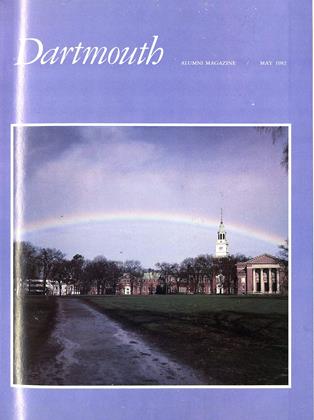The yearling Ivy League Jazz Festival took a giant step forward this spring. The event originated in 1981, when Cornell's jazz director Peter Rothbart invited all the Ivy jazz groups to come and make music at Cornell. The only acceptance he got was from Dartmouth's Barbary Coast band, but the two groups had a grand time, and the Coast's director Don Glasgo suggested that Dartmouth do the hosting next time. Whether it was because of Dartmouth's propitious facilities or simply because the ice had been broken, four groups turned up for the Second Annual Ivy League Jazz Festival in Spaulding Auditorium in April. Harvard and Penn sent their groups up and Cornell brought along its "Thursday band (having left its "Wednesday" band at home, according to Rothbart, who polished his nails on his shirt front as he madthe announcement). Yale, the other Ivy school with a professionally-directed jazz group, had declined because of scheduline difficulties, which probably accounted also for the absence of the student-run groups from Brown and Columbia.
Harvard's director had been taken suddenly ill, and the leaderless band got the evening off to a wobbly start because of it. After a couple of tunes, however, the players got used to conducting themselves and settled into stride. By the time they hit Duke Ellington's "Cottontail," they were in rousing form and delivered some fine solo work on trumpet and sax.
Following Harvard, Cornell put 16 men and one woman onstage and strutted its stuff. A highly disciplined group stronger on composition and arrangement than on improvisation, the Thursday band treated the audience to some outstanding material, including Thelonius Monk's classic "Round Midnight" and Toshiko Akiyoshi's contemporary "My Elegy." The rhythm section was notable, and the whole group played with such skill and joy as to win the audience's heart.
Penn's group was composed primarily of young players, and after the stirring performance by Cornell they sounded somewhat tentative. Hot jazz was not their forte, and they wisely steered away from it into more subdued material such as "Here's That Rainy Day," which they rendered beautifully.
The Barbary Coast was up last, and for this final Spaulding concert of the season. Glasgo altered his usual practice of letting every member have a solo go and turned the session over to the graduating seniors, who grabbed it and ran. They had decreed crazy costumes for the night, and the band trooped onstage amid whoops from the audience. The bass fiddle wore a safari hat all evening, and one saxophonist appeared in an .abbreviated kimono and a geisha wig that looked like nothing so much as a beaver hat decorated with spring-handled fly swatters.
From the swing classic "Lester Leaps In to the original composition of pianist Bernie Thompson '82 (a lewd-lyricked number called "In a Rut"), the Coast pefformed with faultless showmanship and splendid skill. Long known for its emphasis on individual creativity, the band delivered a number of stunning solos.
Glasgo was fascinated, he said, by the contrasts in style and material afforded by the festival. He hopes to see it continue and expand. "Maybe Harvard or Penn would host it next year," he said. "And if more schools joined, we could do an allday festival, or a two-evening one." Could be. The audience was large and varied and big on applause.
 View Full Issue
View Full Issue
More From This Issue
-
 Feature
FeatureWhat keeps them going? A 'Mystic Glue' Perhaps
May 1982 By Dana Cook Grossman -
 Feature
FeatureTerrorism and the Niceties of Justice
May 1982 By Joseph W. Bishop Jr. -
 Feature
FeatureImpacts simply positive
May 1982 -
 Article
ArticleIn the Wide, Wide World
May 1982 By Peter Smith -
 Class Notes
Class Notes1964
May 1982 By Alexander D. Varkas Jr. -
 Class Notes
Class Notes1954
May 1982 By John L. Gillespie








